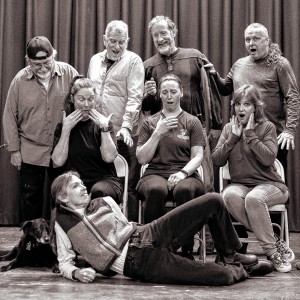The keys to aging well
|
By LOIS FAHEY, RD, LD, CNSC and SHAUNNA MARA, Community Health Educator |
Published: 04-24-2023 8:38 AM |
Who doesn’t want to age well, maintain cognitive function, and be as active as possible, for as long as possible? What we eat and how physically active we are play a major role. We are in control of these things. Here are some general guidelines to move the needle towards better health (recognizing that individuals may have medical conditions that require a specific therapeutic diet).
Older adults need more protein per pound of body weight. This will help prevent “sarcopenia,” or loss of muscle that increases risk of falls and fractures. We also need adequate protein for wound healing and immune function. Healthy sources of protein include legumes, beans, seeds, nuts, fish, chicken, eggs, and fish.
Increase your intake of colorful fruits and vegetables. Different colors provide your body with vitamins, minerals and naturally occurring “phytochemicals,” substances that may have antioxidant and anti-inflammatory benefits. These substances may lower your risk of cancer, heart disease, and cognitive decline. Aim for 2 cups of fruit and 2 ½ cups of vegetables a day. Try something new!
This means 1 drink /day for females, 2 for males. The less, the better.
Our sense of thirst decreases with age. Chronic dehydration, even mild, increases the risk of urinary tract infections, falls, constipation, and blood clots. Water aids in digestion and absorbing nutrients, getting rid of waste, and even cushions and lubricates our joints.
Eating more fruits, vegetables, whole grains, beans, legumes, nuts, and seeds along with eating less animal and saturated fats may decrease the risk of heart disease, certain cancers and may slow or prevent cognitive decline. This way of eating is naturally low in sodium, high in fiber, and low in sugar. Think vegetarian chili, beans and rice, and lentil soup!
Get help if you are food-insecure. Resources include SNAP benefits (food stamps), congregate meals at senior centers, Meals on Wheels, and local food pantries.
Older adults need at least 150 minutes a week of moderate intensity activity such as brisk walking or 75 minutes a week of vigorous intensity activity such as hiking, jogging, or running.
Article continues after...
Yesterday's Most Read Articles
 Regal Theater in Concord is closing Thursday
Regal Theater in Concord is closing Thursday
 Former Franklin High assistant principal Bill Athanas is making a gift to his former school
Former Franklin High assistant principal Bill Athanas is making a gift to his former school
 Another Chipotle coming to Concord
Another Chipotle coming to Concord
 Vandals key cars outside NHGOP event at Concord High; attendee carrying gun draws heat from school board
Vandals key cars outside NHGOP event at Concord High; attendee carrying gun draws heat from school board
 Phenix Hall, Christ the King food pantry, rail trail on Concord planning board’s agenda
Phenix Hall, Christ the King food pantry, rail trail on Concord planning board’s agenda
 On the Trail: New congressional candidate spotlights border, inflation, overseas conflicts
On the Trail: New congressional candidate spotlights border, inflation, overseas conflicts
Improve your strength by using machines, free weights, resistance bands, your own body, and even canned goods. Heavy resistance is required to build muscle and bone. Remember to exercise in a safe way and to your own ability.
Besides improving overall strength, your metabolism may burn fat more efficiently, decrease abdominal fat, improve heart function and lower blood sugar levels, just to name a few. Science supports these findings and many more.
The benefits of physical activity can be discovered at any age and in every body. Start slowly, find a friend, seek out knowledgeable fitness instructors, and always consult with your physician and ask for the fitness prescription which is a plan of activities designed for a specific purpose. In combination with cardio, balance and stretching, results are endless.
Lois Fahey, RD, LD, CNSC, is the staff nutritionist at Granite VNA. She loves meeting people where they are at, literally, and figuratively on their journey to better health.
Shaunna Mara, is a Community Health Educator at Granite VNA. She has been educating older adults in strength training for more than 15 years.


 NH Furniture Masters present new member show this spring
NH Furniture Masters present new member show this spring Sunapee Kearsarge Intercommunity Theater presents ‘Olympus On My Mind’ in April
Sunapee Kearsarge Intercommunity Theater presents ‘Olympus On My Mind’ in April Vintage Views: The greatest factory that never was
Vintage Views: The greatest factory that never was Inspired by Robert Frost, New Hampshire Poet Laureate Jennifer Militello has achieved her childhood dreams
Inspired by Robert Frost, New Hampshire Poet Laureate Jennifer Militello has achieved her childhood dreams
